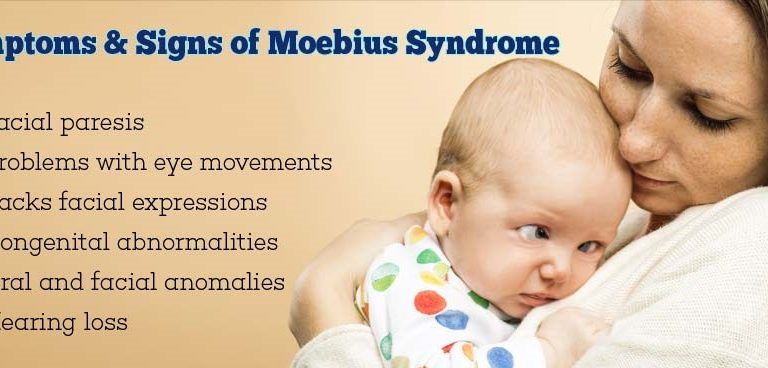Moebius syndrome is a rare genetic neurological condition that affects the muscle groups responsible for eye movement and facial expression. Other symptoms include facial paralysis, present in most people who cannot make any facial expressions or even close their eyes.
Moebius syndrome has the following features-
- Unable to frown, smile or movement of the eyes.
- Breathing and/or swallowing difficulties.
- Clubbed feet missing fingers or toes are examples of limb abnormalities.
- Missed teeth, that shows dental abnormalities.
- Hearing difficulties.
- Pectus carinatum.
- Poland Syndrome.
Moebius Syndrome: Causes
The exact reason what causes Moebius Syndrome is unknown. Researchers say it is caused by a combination of environmental and genetic factors, and an estimated 2 to 20 cases of Moebius syndrome occur every million births.
Those with Moebius syndrome are born with microstomia (small-mouth) and micrognathia (small-chin). For example, an unusually shaped tongue with a high roof of the mouth and an abnormal, arched opening (cleft palate). These abnormalities contribute to speech problems, common in children with Moebius syndrome. Dental irregularities, such as missing or misaligned teeth, are also quite common.
Visual impairments, respiratory issues, sensory integration dysfunction, speech and swallowing disorders, a lack of upper body strength, and sleep disorders are common symptoms. Since around 30% of Moebius syndrome children are also in the autism spectrum, one must take care.
Moebius syndrome: Treatment
While no single medical treatment or cure is available for Moebius syndrome, one can treat the symptoms medically. Speech-language therapy physical occupational treatments all aid in improving motor skills. All of these result in more controlled eating and speaking.
In a few cases, familial symptoms have been seen.
While there is no single medical treatment or cure, treatment is available based on symptoms. Physical, occupational, and speech-language therapy can help improve motor skills and coordination, resulting in more controlled speaking and eating.
Familial patterns have been reported in a few cases. Moebius syndrome is most likely multifactorial, which means that genetic and environmental factors play a role in its development. Different underlying causes may exist in several cases (heterogeneity).
There is evidence that Moebius syndrome is a dominant genetic disorder. This implies that one copy of an abnormal gene is required for the disease to manifest; this is a dominant genetic disorder. The abnormal gene could have been inherited from either parent or resulted from gene change in the affected person. The risk of passing the abnormal gene from affected parent to offspring is 50% for each pregnancy, which goes regardless of the sex of the resulting child.
Several theories explain the cause of Moebius syndrome. The disorder is caused by reduced or interrupted blood flow to the fetus during pregnancy. The reasons include mechanical, environmental, or genetic factors.
| Moebius Syndrome Awareness Day Moebius Syndrome Awareness Day is an annual global event held on January 24th, the birthday of Professor Paul Julius Moebius, the doctor who first diagnosed the condition in 1888. |
Moebius Syndrome: Diagnosis with Gigadocs
The characteristic signs/symptoms, a detailed patient history, and a thorough clinical evaluation are used to diagnose Moebius syndrome. There are no diagnostic tests that can confirm a Moebius syndrome diagnosis.
Gigadocs offers teleconsultation with the best neurologists, ophthalmologists, speech pathologists around you at a time convenient to you from the safety of your home. Download the Gigadocs app to read health tips, avail the best of healthcare, and connect with the best doctor around you-
Download Gigadocs app from-
- IOS App – apple.co/2W2iG4V
- Android App – bit.ly/33AQoRC
To know more and schedule a Virtual Consultation demo, Email at info@gigadocs.com




